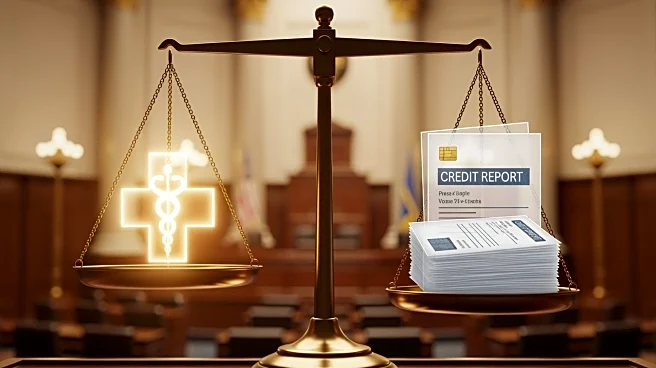What's Happening?
D.C. lawmakers are advancing a bill aimed at preventing medical debt from appearing on credit reports, despite recent guidance from the Consumer Financial Protection Bureau (CFPB) stating that only the federal
government has the authority to enact such measures. This move is part of a broader effort by more than a dozen states, including Virginia and Maryland, to protect individuals from the financial repercussions of unpaid hospital bills, which can adversely affect borrowing for mortgages and cars, and impact job and rental applications. The CFPB's new interpretation of the Fair Credit Reporting Act reverses previous guidance from the Biden administration, and comes as states prepare for changes in healthcare access and affordability due to legislative shifts and the expiration of enhanced premium subsidies under the Affordable Care Act.
Why It's Important?
The bill's progression highlights the ongoing debate over state versus federal authority in consumer protection, particularly in the realm of medical debt. With approximately 14 million Americans owing at least $220 billion in medical debt, which disproportionately affects people of color, the issue is significant. The CFPB's stance could lead to legal challenges, as seen in Colorado, and may influence how states legislate consumer financial protections. The potential impact on credit scores and borrowing terms underscores the importance of this legislation for individuals struggling with medical debt, especially in economically vulnerable communities. The bill also reflects broader concerns about healthcare affordability and access, as changes in federal policy could increase the number of uninsured or underinsured Americans.
What's Next?
The bill introduced by D.C. council member Christina Henderson, along with seven colleagues, seeks to prohibit the reporting of medical debt to credit agencies and prevent wage garnishments and home liens for such debt. It also aims to enhance transparency by requiring healthcare providers to publicize financial assistance programs. The D.C. Department of Health and the attorney general would oversee enforcement. As the bill progresses, it may face legal challenges based on the CFPB's guidance, and its success could influence similar legislative efforts in other states. The outcome will likely depend on judicial interpretations of state versus federal authority in consumer protection.
Beyond the Headlines
The legislative push in D.C. reflects broader systemic issues in healthcare and consumer finance, highlighting the need for comprehensive reforms to address medical debt. The bill's focus on transparency and financial assistance programs suggests a shift towards more proactive measures in consumer protection. Additionally, the debate over state versus federal authority in this area may set precedents for future legislation, potentially reshaping the landscape of consumer rights and healthcare affordability. The involvement of nonprofit organizations advocating for economic justice indicates a growing movement towards addressing inequalities in healthcare access and financial burdens.









